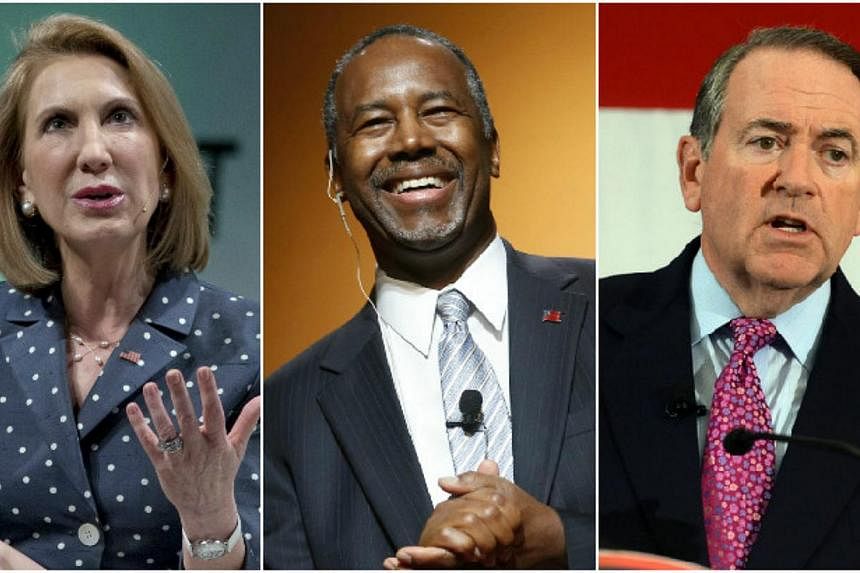This week, the Republican field of White House hopefuls doubled from three to six, with former Hewlett-Packard (HP) CEO Carly Fiorina, retired neurosurgeon Ben Carson and former Arkansas governor Mike Huckabee throwing their hat into the ring.
They join three senators - Ted Cruz, Rand Paul and Marco Rubio - on the increasingly crowded list of candidates.
By all accounts, there are many more to come. Observers say there could be up to 21 names on the list by end of the year. These include current frontrunners in the polls - former Florida governor Jeb Bush and Wisconsin governor Scott Walker - as well as the likes of New Jersey governor Chris Christie, former senator Rick Santorum and Louisiana governor Bobby Jindal. Even businessman Donald Trump is eyeing a run.
On the side of the Democrats, there are just two: Senator Bernie Sanders and former secretary of state Hillary Clinton. There has been talk of vice-president Joe Biden and former Maryland governor Martin O'Malley also considering joining the race but that's about it.
Why is the Republican field so packed? Here are five reasons:
1. They don't have a Hillary
When former HP chief Carly Fiorina announced her candidacy on Monday (May 4, 20015), polls had her attracting about 1 per cent of support from Republican primary voters. Why bother running when only 1 per cent of your party supports you? Well, because they are not heavily backing anyone else either. The most popular theoretical candidate is former Florida governor Jeb Bush and he has only around 15 per cent support in his party - hardly a runaway. Without a frontrunner soaking up all the attention and money, most people feel like they stand a decent chance of scoring a victory, and they may be right.
2. It's just Hillary
The former secretary of state might be running away with the Democratic Party nomination right now, but Republicans believe she can be beaten. They see potential weaknesses in her campaign and think they can make the most of her handling of the 2012 attack on the US diplomatic compound in Benghazi, Libya, the scandal involving foreign donors to the Clinton foundation and her use of private email for official business while serving as secretary of state. Mrs Clinton also has history against her. Since World War II, a candidate from the same party as a departing two-term president has lost the next election six out of seven times. Republicans probably see this as the best chance they have to win the White House in eight years and no one wants to miss out.
3. Factions, factions, factions
From the Tea Party to moderate establishment-types, from libertarians to the Christian conservatives, the Republican Party is now beset with a multitude of factions. And these different groups all seem to support different people. Play their cards right and it may be possible for a candidate to ride the support on just one group to secure the party nomination. The bar to success seems to have been lowered.
4. Easy money
It used to be only establishment-backed, mainstream candidates could secure funding from party donors to pay for their campaigns. It was difficult for minor candidates to get airtime in the media to reach a wide base of donors.
But social media has changed all that.
Said Mr Joshua Spivak, senior fellow at the Hugh L. Carey Institute for Government Reform: "We are seeing the impact of easy fundraising and easy access to voters through social media. Candidates who previously couldn't get mentioned in the days of the Big Three Television Networks, like a Ben Carson, are now able to 'do it themselves'."
5. Even losers can win
In the end, only one person can be the nominee. What happens to the others? It's not always bad. Take for example businessman Herman Cain's short-lived run for the White House in 2012. He was widely mocked for a poorly-run campaign but still achieved national fame for some sensational statements. He once famously said about his preparation for "gotcha" questions on foreign affairs: "When they ask me who is the president of Ubeki-beki-beki-beki-stan-stan, I'm going to say, you know, I don't know. Do you know?"
Still, Mr Cain, whose campaign ultimately ended when he was accused of sexual harassment, went on to get a radio show, write a book and become a contributor on Fox News. It is a well-trodden path: candidates become famous for running for president and then parlay that fame into lucrative speaking fees or book and TV contracts for years.

